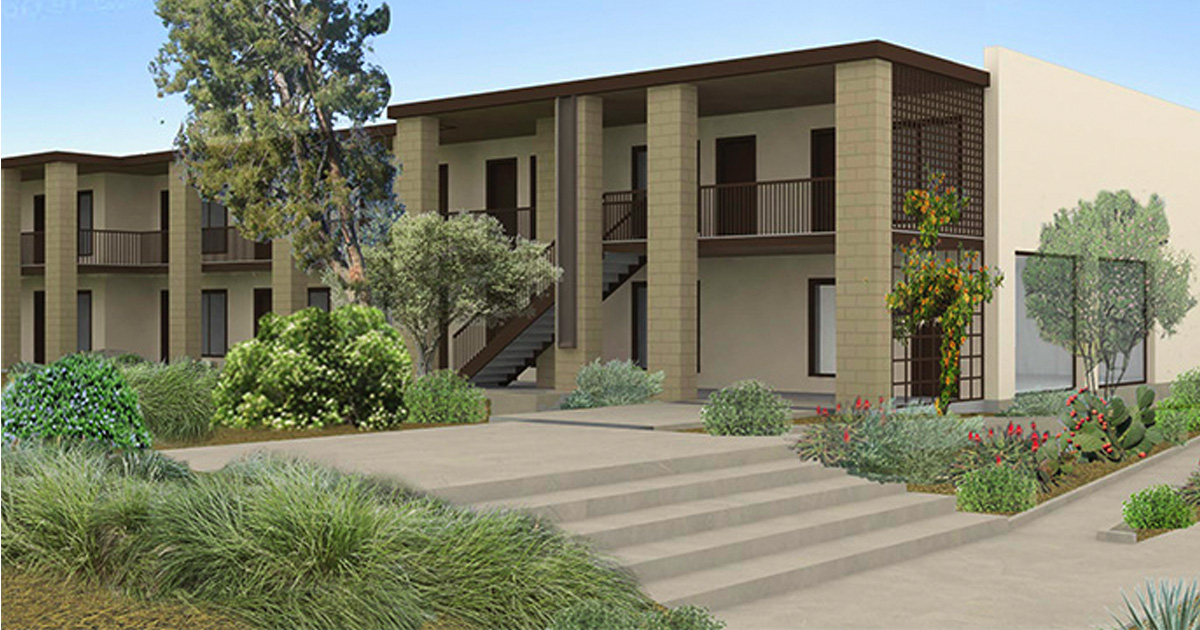
An artist’s rendering shows the affordable housing complex for at-risk families at St. Michael’s Ministry Center in Riverside.
[The Episcopal News] Since Anthony Rothstein moved into St. Michael’s Apartments a few days ago he’s been busily helping other residents settle into one- and two-bedroom units at the affordable housing complex at St. Michael’s Episcopal Ministry Center in Riverside.
“It’s exciting. We’ve got a bunch of move-ins going on right now. I’m trying to schedule at least five a day and have everybody moved in by the end of the month,” said Rothstein in a recent telephone interview with The Episcopal News. As caretaker, he will live onsite and facilitate case management for residents of the 49-unit apartment complex.
Construction began on the $17-million project in 2021 in cooperation with Community Development Partners to serve housing-insecure people in the Riverside community, where St. Michael’s has ministered since the mid-1950s. CDP’s founders share 30 years’ experience dedicated to social change through community development and investment. Since 2011, CDP has successfully built a portfolio of 19 unique projects comprising more than 1,400 units and $300 million in total development costs.
“I am giving thanks for the incredible support for the St. Michael’s Apartments project and for the strong teamwork it took to make it happen,” the Rev. Canon Mary Crist told The News via text. “It took four years to design and secure approval for the plans and nearly two years to build it.
“We have made many friends along the way,” Crist said. “I know it hasn’t been easy for our neighbors to endure the disruptions caused by construction and I thank them for their patience. May God bless our efforts to bring safe permanent housing and support to 90 people who have been going without them for years.”
Bishop John Harvey Taylor has pledged to create similar opportunities throughout the Diocese of Los Angeles. “We have 128 churches, not just in your magnificent city but all over six counties in Southern and Central California,” he told Los Angeles Mayor Karen Bass during the Jan. 15 annual diocesan Martin Luther King Jr. Day celebration. “Homelessness is a regional crisis, and we’re committed to building affordable permanent supportive housing on 25 percent of our church campuses.”
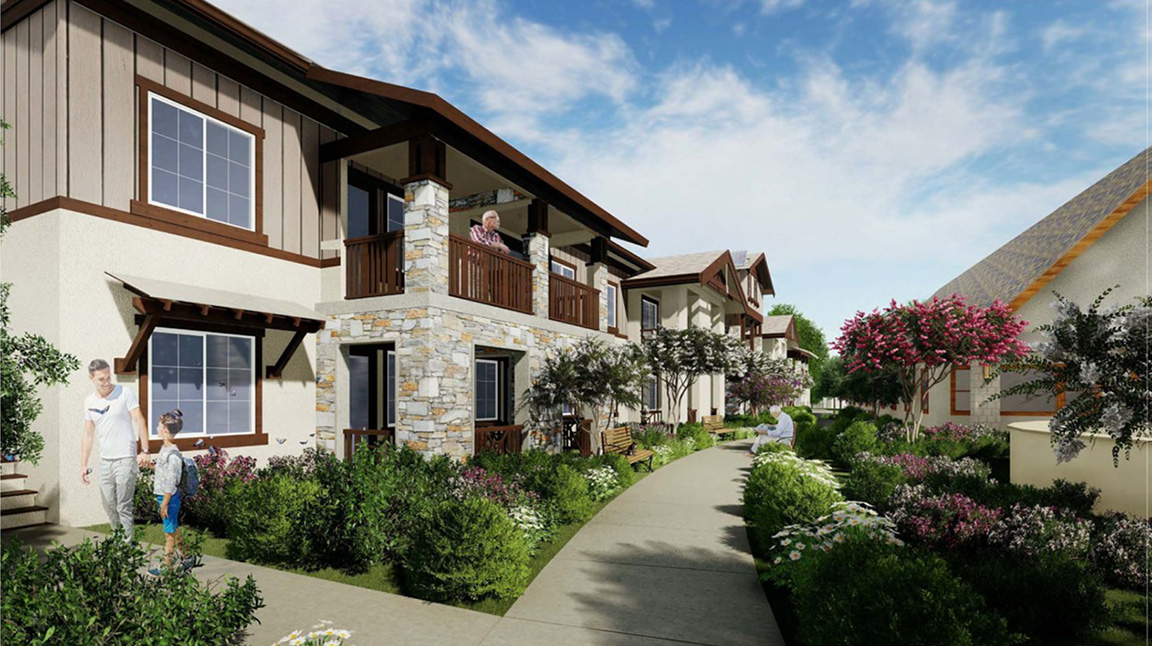
The proposed Santa Angelina senior housing complex next to Placentia’s Blessed Sacrament Episcopal Church is show in this artist’s rendering. Artwork: National Community Renaissance
Work began in August 2022, on the Santa Angelina affordable housing for seniors at the Church of the Blessed Sacrament in Placentia, expected to include a senior center, and 65 affordable apartment homes with 21 available to seniors already experiencing homelessness or who are at risk of becoming homeless.
Blessed Sacrament is partnering with the Southern California-based National CORE, one of the nation’s largest nonprofit developers of affordable housing, for the project, expected to be completed in 18 months.
A 66-apartment project, the Orchard View Gardens senior development at St. Joseph’s Church in Buena Park, is expected to cost about $25 million and to break ground this summer, with completion anticipated in 2024.
Episcopal Communities and Services (ECS), an institution of the diocese, is a partner in the project, linking congregations with National Community Renaissance, or National CORE, a leading nonprofit affordable housing developer, which manages more than 10,000 units nationally.
“There are 10 more on the drawing board … by the grace of Almighty God, there are 20 more to come,” Taylor has said.
Affordable housing projects proceed in Anaheim, Garden Grove
Affordable housing projects at St. Michael’s Church in Anaheim and at St. Anselm’s Church in Garden Grove also have moved forward in the process, with the approval in February of ground leases by both the Corporation of the Diocese and the Standing Committee.
The Anaheim project, in partnership with Habitat for Humanity, Orange County, anticipates construction of approximately 20-28 residential townhomes at a projected cost of $10 million. Each townhome is projected to accommodate about 1500-square-feet of living space, three to four bedrooms, two to three bathrooms and two-car direct access garages.
The Rev. Juan Jimenez said the congregation is thrilled by the project, which includes refurbishment of outdated campus spaces like offices, restrooms, kitchen, and parish hall.
“We are excited. We really like the idea because it is a way for us to serve the community. We have all this space that we don’t really use, and now we can put it to good use. The plus side is, it will also help us to extend ministry, to keep the ministry going here.”
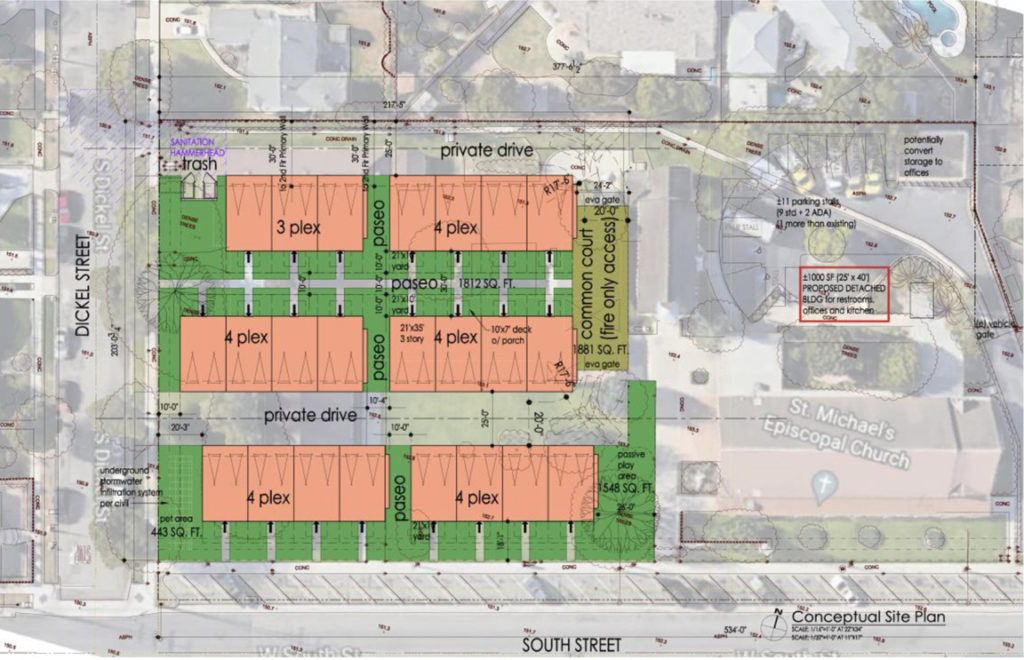
The affordable housing plan at St. Michael’s, Anaheim, calls for improvements to the church and the historic chapel and construction of a new parish hall and ancillary space.
There are four components to the project, including improvements to the church and the historic chapel, construction of a new parish hall and ancillary space, and construction of the affordable housing, according to the plans. New construction will include a housing unit to be designated as a rectory, creation of a commercial-grade kitchen, restrooms and two offices.
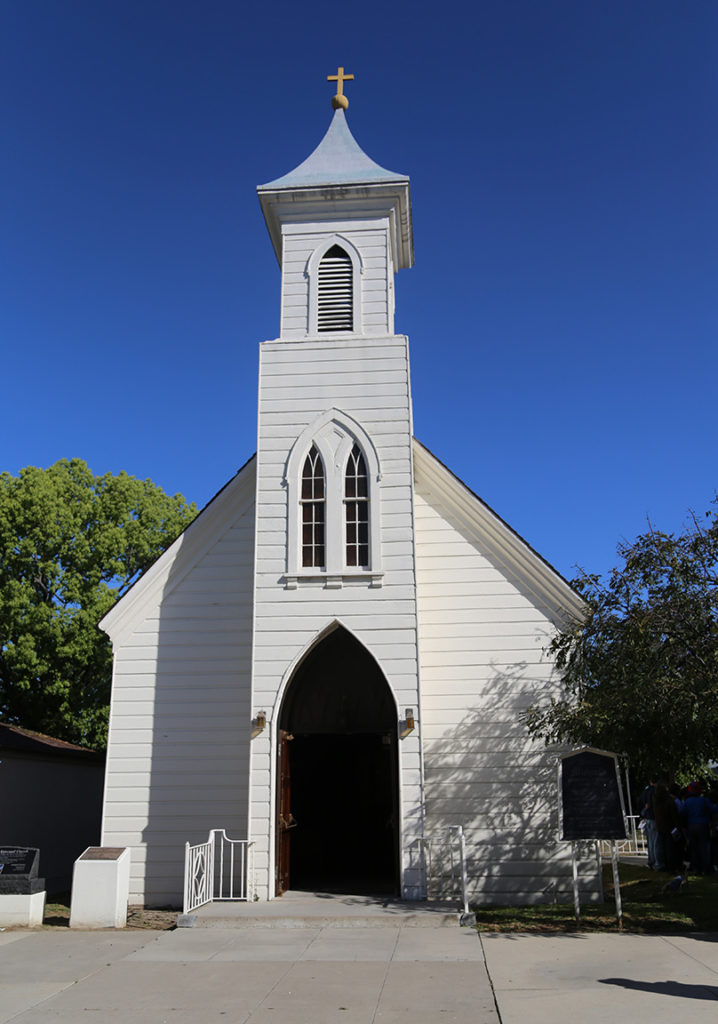
The historic original St. Michael’s Church – now known as “the little church” – will be upgraded as part of the new housing plan for use for weddings and other special services. Photo: Janet Kawamoto
Habitat for Humanity of Orange County is part of a global, nonprofit housing organization operated on Christian principles that seeks to put love and faith into action by building homes, communities, and hope.
St. Michael’s also has received support from St. James’ Church, Newport Beach, as it developed the housing plan. “It has been an honor to collaborate with the Habitat for Humanity team, Fr. Jiménez, the diocese and my St. James team,” said the Rev. Canon Cindy Evans Voorhees, vicar of St. James; “not only to create a great project for the church and the city of Anaheim, but also a model for future housing projects on sacred ground across the country. From the beginning of the project we kept this in mind so that future projects had a template to start with and could customize it to their needs. It’s a win-win for everyone, especially for new homeowners!”
Similarly, in Garden Grove, the Rev. Thomas Moon Lee views plans to construct a $37 million 100-unit affordable housing project in partnership with Korean Community Service and Domus Development on the St. Anselm of Canterbury Church’s campus as an opportunity to expand established ministries to the community.
“We are so excited,” Lee told The News during a recent telephone interview. “It’s like most modern churches; we’re dealing with the same issues, sustainability. This is a win – win for everybody.”
Mercy House, founded in 1988 in Santa Ana, offers extensive services to homeless individuals and will provide case management and other services to residents upon project completion.
The St. Michael’s project in Anaheim will include 24 units of permanent supportive housing for area homeless individuals who earn at or below 30 percent of the area median income, or the 2018 federal poverty guideline of about $14,150. The project will also include 25 units for low-income individuals and families earning no more than 80 percent of the area median income, along with a property manager’s unit.
The two-story structure will also house case management offices, space for educational classes, and a community garden. Plans also call for establishment of a committee, consisting of area residents, St. Michael’s and Mercy House staff, to help ensure the facility’s smooth operations.
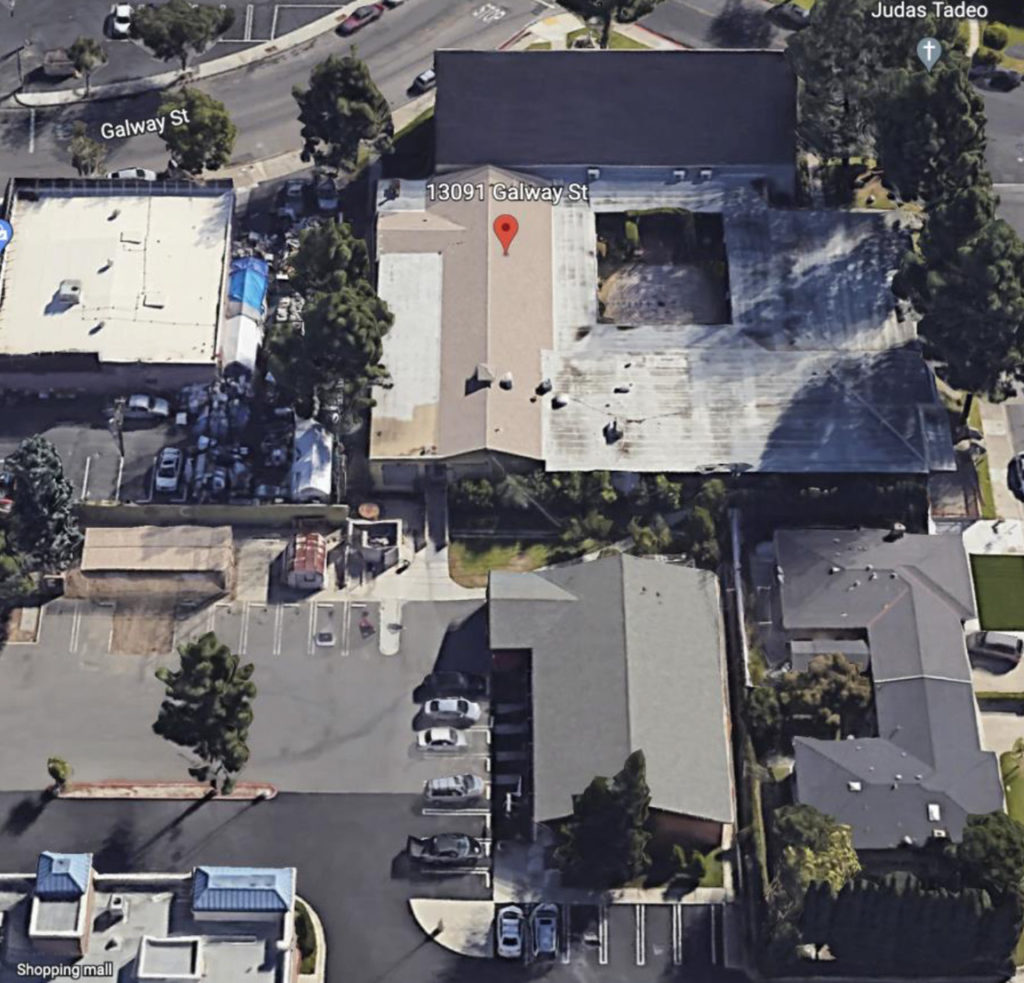
An arial photo shows existing facilities at St. Anselm’s Church, Garden Grove. According to the plans (which are preliminary and subject to change), most of the buildings, except the church itself, will be demolished to make way for new housing and community facilities.
St. Anselm’s has long provided immigration, citizenship, DUI programs, food provisions, and many other related services for Koreans, Vietnamese, and Latino people in their communities. KCS is a nonprofit social and healthcare service provider to underserved communities and individuals throughout Orange County.
The project is in the early predesign stage and may evolve over time, according to documents submitted to the Corporation of the Diocese and the Standing Committee. Current plans call for replacement of most buildings on campus except the church.
The new construction is expected to be a 4-story wood frame structure with the ground floor consisting of some units and common space for services for the tenants and the church. Domus Development has over 20 years of experience developing affordable housing in California.
